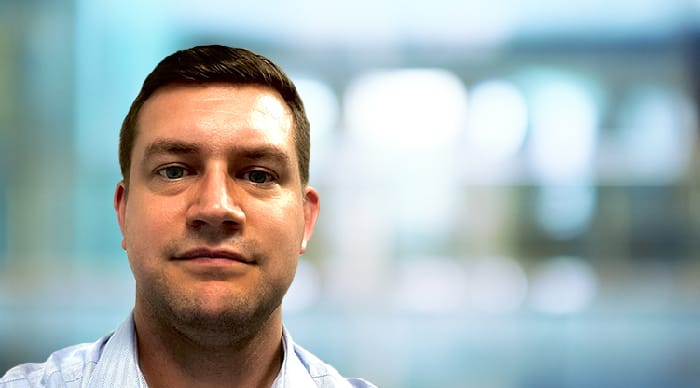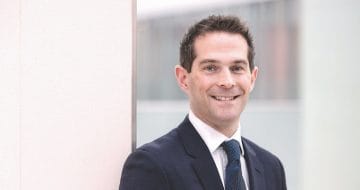Burges Salmon senior associate Peter Ramsden shares an overview of his career journey and the challenges he faced along the way

Peter Ramsden, a senior associate at Burges Salmon, didn’t follow the most straightforward route into the legal profession.
Peter didn’t apply for a training contract while studying law at the University of Manchester (unlike some of his peers) and on finishing his degree he self-funded the Legal Practice Course (which was much cheaper then) before accepting a position as a paraprofessional in the forensic services team at PwC. While he briefly considered changing career paths and becoming an accountant, Peter ultimately decided that the aspects of the work he enjoyed most at PwC were the touchpoints with law. He says:
“The criminal law and family law experience I had while working at a law firm during university holidays, plus the fact that I enjoyed fraud investigations at PwC, made me realise that I wanted to pursue a career in commercial law rather than criminal, family or child law (which was what I had enjoyed studying at university and thought I wanted to practise).”
He then landed a paralegal position at Herbert Smith (now Herbert Smith Freehills) and spent six years in this role, initially working as a general paralegal and assisting lawyers in the corporate energy and infrastructure group, before spending the last three years working exclusively with the professional support lawyer in that team. “I got to work on lots of interesting queries with the professional support lawyer, who was a regulatory specialist, and as a result developed a decent grasp of energy regulation,” Peter explains.
Since the partners he worked with knew Peter was applying for training contracts elsewhere, they encouraged him to apply to Herbert Smith. Nevertheless, it took Ramsden three attempts to secure his training contract — his first application was rejected because while he has three As and a D at A-Level, at that point in time the firm didn’t recognise one of his As (in general studies) and thus determined that he didn’t have the requisite grades (AAB), and then his second application was rejected because he failed a psychometric test, which he admits to “having underestimated and thus failing to properly prepare for, based on successfully completing just a few, simple trial questions”. When it comes to dealing with training contract application rejections, Peter encourages students and graduates not to take them personally and to step back and assess what they can improve on. In his case, with Herbert Smith he did this by practising “many, many” online psychometric tests, thus ensuring he was fully prepared when making his third, successful, training contract application.
After having completed his training contract, over four years of post-qualification experience, and having become a father, Peter applied for a job with Burges Salmon as he wanted to continue doing top-quality work while also seeking a slightly better work/life balance and to be closer to family in the South West. “Burges Salmon has a brilliant reputation in the energy sector and competes with City firms for the same kind of work,” says Peter. “Since joining the firm in July 2019 I have been able to focus exclusively on energy work, which was always what I enjoyed most.”
According to Peter, Burges Salmon’s energy team works on a wide range of different projects, many of which involve renewables and clean technologies and will contribute to the end goal of reducing greenhouse gas emissions and achieving net zero by 2050. While the energy team has always been busy, particularly with renewables work, the firm is now doing more work on an increasingly diverse mix of clean, and in some cases market disruptive, energy technologies (including battery storage, fusion, carbon capture and storage, and electric vehicles) as tackling climate change becomes a high ranking political priority.
In order to illustrate this variety, Peter gives some examples of projects he is working on including a fusion project, some corporate power purchase agreements, a carbon capture and storage project, and some work for a new start-up whose business model involves using renewable electricity to mine for cryptocurrency. “We helped the client to prove their commercial concept by getting a couple of pilot projects off the ground, and are now helping to draft commercial contracts they can use for longer term arrangements with customers.” Energy lawyers can also expect to field regulatory queries and get involved in due diligence on M&A transactions and refinancings. “We have a client that wants to buy a portfolio of wind, hydro and landfill gas projects so we are doing due diligence into those assets for them,” Peter explains.
So how can aspiring lawyers enter this dynamic, rapidly evolving sector? “Try and get as much relevant work experience as you can”, advises Peter, “even doing general paralegal work at the right kind of firm could give you a foot in the door and lead to opportunities to secure more specific experience in the energy sector”. Students should also consider applying for work experience or placements at energy companies, some of which have decent sized in-house legal teams, as this demonstrates a genuine interest in the field and could help to differentiate candidates from other applicants. “It is crucial that candidates can stand out from the increasingly competitive crowd and demonstrate a keen, and well informed, interest in the area when interviewing for training contracts”, adds Peter, “so they should keep track of what is happening in the market generally by reading any relevant briefings that law firms are publishing, signing up for email alerts from Ofgem and gov.uk, and reading decent newspapers (including, dare I say it, the Financial Times)”.
Although the route to qualification was a long and bumpy one for Peter, his experience helped him to hone in on what he really wanted and brought him closer to his career in the energy sector. He encourages aspiring lawyers to persevere and develop resilience:
“If you have decided that law (energy or otherwise) is the career for you, then you have to stick with it despite any knocks and keep building up your skills and experience — you will get there in the end.”
Peter Ramsden will be speaking alongside other Burges Salmon lawyers during ‘Climate change, business and the law — with Burges Salmon’, a virtual student event taking place next week, on Thursday 14 October. You can apply to attend the event, which is free, now.
About Legal Cheek Careers posts.


